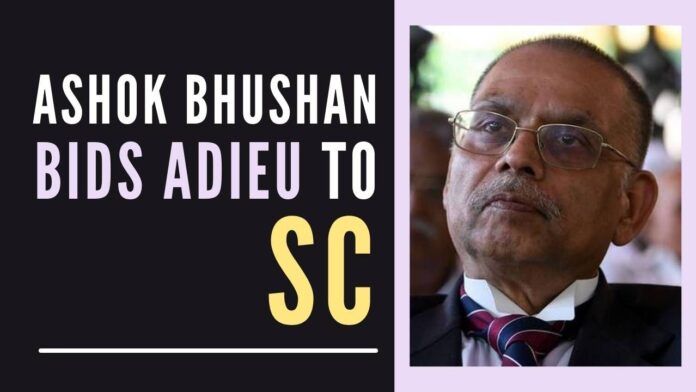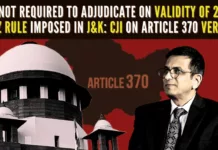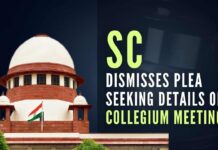
Justice Ashok Bhushan retires from SC
One of the humanist judges, Justice Ashok Bhushan bid farewell to Supreme Court on June 30 after delivering two welfare-centric judgments to those suffering from the past 16-month-long COVID-19 pandemic. On Wednesday, Chief Justice of India N V Ramana said that Supreme Court judge Justice Ashok Bhushan, who is set to retire on July 4, has always been a “valuable colleague” and his judgments stand testimony to his “welfarist and humanist” approach. The CJI, while bidding farewell to Justice Bhushan, said that he will be remembered and thanked for his judicial contributions and that he has been a great value addition to the higher judiciary.
June 30 was Justice Ashok Bhushan’s last working day. His mother passed away recently, and he has to attend her last rites in the coming days. On Wednesday, the Bench passed judgment on the need for granting ex-gratia to COVID-19 victims. On Tuesday Bhushan-headed Bench passed a detailed judgment directing all States to implement the One Nation One Ration Card and several welfare measures for migrant and un-organised sector labour[1].
In his farewell speech, CJI Ramana said that Justice Bhushan’s journey has “truly been remarkable” and he has spent nearly two decades delivering justice in constitutional courts.
Justice Bhushan, who was elevated as an apex court judge on May 13, 2016, was part of several landmark judgments including the November 2019 landmark verdict by a five-judge Constitution bench which cleared the way for the construction of Ram Temple at Ayodhya. He was also part of a five-judge Constitution bench which had in September 2018 declared the Centre’s flagship Aadhaar scheme as constitutionally valid but struck down some of its provisions including its linking with bank accounts, mobile phones and school admissions[2].
Besides, Justice Bhushan headed the five-judge Constitution bench which had last month refused to refer to a larger bench the issue of whether to revisit its 29-year-old Mandal verdict putting a cap on quotas at 50 per cent and quashed a Maharashtra law granting reservations to Marathas in admissions and government jobs in the state, saying it violated the principle of a right to equality.
In his farewell speech, CJI Ramana said that Justice Bhushan’s journey has “truly been remarkable” and he has spent nearly two decades delivering justice in constitutional courts. “Justice Bhushan has always been a valuable colleague. His presence on the bench and on the committees that I am a member of has been so very reassuring. Simply because, he is, first and foremost, a great human being. This quality has found abundant reflection in the discharge of his duties – both while facing and adorning the bench,” said the CJI, who was heading a bench that also comprised Justice Bhushan.
“His judgments stand testimony to his welfarist and humanist approach. His concern for the welfare of every section of the society is reflected in his opinions and writings,” he said. Justice Bhushan said it is a matter of “great pride” to be a part of the Supreme Court. “Bar and the Bench are part of two wheels and the relationship of the bar and the bench is like that of sea and clouds,” he said, adding that Bar has always stood for democracy and rule of law.
Attorney General K K Venugopal, Solicitor General Tushar Mehta and senior advocate and President of Supreme Court Bar Association Vikas Singh also bid farewell to Justice Bhushan. Justice Bhushan had obtained a law degree from Allahabad University in 1979 and was enrolled as an advocate with the Bar Council of Uttar Pradesh on April 6, 1979. He was elevated as a permanent judge of the Allahabad High Court on April 24, 2001. He was sworn in as a judge of the Kerala High Court on July 10, 2014. Justice Bhushan was sworn in as the chief justice of Kerala High Court in March 2015.
References:
[1] Supreme Court directs Center to frame norms for ex-gratia to families of Covid victims. Says Prime Minister headed NDMA failed to perform its duty – Jun 30, 2021, PGurus.com
[2] Aadhaar Case: Supreme Court Says Centre’s Flagship Scheme Valid – A Timeline – Sep 26, 2018, India.com
- NIA confiscates Pak-harboured Khalistani terrorist Lakhbir Singh Rode’s key aide’s land in Moga - April 19, 2024
- Prime Minister Narendra Modi: A Gujju businessman who does not invest his precious time for a losing battle - April 13, 2024
- NIA arrests two accused Shazib and Taahaa in Bengaluru’s Rameshwaram Cafe blast case from Kolkata - April 12, 2024











Humanist and outstanding Judges help us keep our faith in the judicial system. Just as the issued related to covid victims were addressed why do we not see an action on the issues of the inordinate delays in the courts and any action on the huge number of people languishing the jails pending trails. At the highest level the accountability can be addressed by impeachment but what happens to the lower judiciary? Never heard of them being hauled up for kind of pronouncement given by them even when is finally gets corrected in the higher courts. In our system is it not the higher judiciary which should be supervising the lower courts ? Which is obviously wanting given the absurd judgements not being punished. The correction can only come if the humanist judges collectively push for correction.